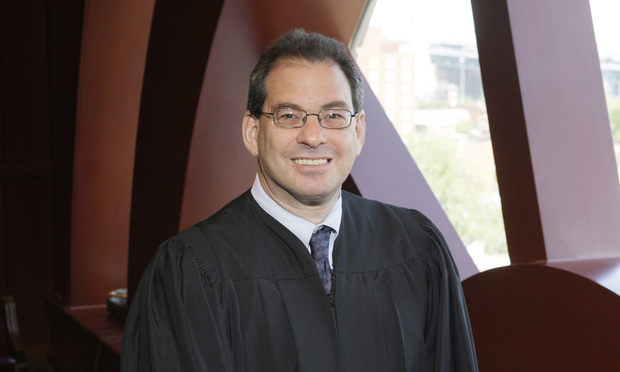Judge Green-Lights Discovery in Subaru Infotainment System Class Suit Amid 'Overblown' Cost Concerns
"Defendants' concern about 'extremely expensive' discovery is overblown," U.S. Magistrate Judge Joel Schneider said.
March 14, 2019 at 08:59 AM
6 minute read
 Joel Schneider (Photo: Carmen Natale/ALM)
Joel Schneider (Photo: Carmen Natale/ALM)
A Camden federal judge on Tuesday denied Subaru of America's motion to stay full discovery in a putative, nationwide class action pitting the automaker against plaintiffs alleging the company sold and leased cars with a defective infotainment system.
U.S. Magistrate Judge Joel Schneider of the District of New Jersey issued a memorandum opinion and order that allows for limited discovery to proceed while Subaru awaits a ruling on its motion to dismiss the case that it filed last Feb. 28. The judge also said Subaru's cost concerns over allowing discovery—even limited discovery—while it awaited the motion to dismiss decision were “overblown.”
“Defendants' concern about 'extremely expensive' discovery is overblown,” Schneider said. “As is always the case, the court expects to closely manage discovery to assure that plaintiffs' efforts are proportional. Further, contrary to defendants' argument, a discovery stay will not simplify the issues for trial. In fact, the opposite is true.
“The court's resolution is fair to all parties,” Schneider wrote. “On the one hand, plaintiffs can immediately proceed to obtain plainly relevant and important core discovery. On the other hand, the 'floodgates' of discovery will not open until defendants' motion is decided and the issues to be litigated are joined.
“For the reasons to be discussed, defendants' request is denied with the proviso that only limited and focused discovery on core issues will be permitted,” Schneider wrote.
In Chad Udeen and Mary Jane Jeffery v. Subaru of America, the plaintiffs allege that a Starlink infotainment system defect in certain Subaru vehicles created a safety hazard. Subaru and other defendants have denied all liability allegations but acknowledged that, even if they prevailed in their motion to dismiss the case, warranty claims among California plaintiffs would still stand.
Schneider, referencing Gerald Chalames v. OKI Data Americas, a District of New Jersey decision from 2007, said “the mere filing of a motion to dismiss does not stay discovery.” He listed four factors upon which to determine whether a stay should be entered, used in Jackson v. Trump Entertainment Resorts, a District of New Jersey decision from 2015. The four were: whether a stay would unduly prejudice or present a clear tactical disadvantage to the nonmoving party; whether denial of the stay would create a clear case of hardship or inequity for the moving party; whether a stay would simplify the issues and the trial of the case; and whether discovery is complete and/or a trial date has been set.
“After examining all relevant evidence, the court finds the relevant factors weigh in plaintiffs' favor and, therefore, the court will deny defendants' request to stay all discovery,” Schneider wrote. “The court agrees that plaintiffs will be prejudiced if all discovery is stayed while waiting for defendants' motion to be decided.”
He said the plaintiffs have the right to move forward with their complaint and that furthering the delay increases the chance that relevant evidence could get lost, memories fade or witnesses could became unavailable before the case goes to trial.
“The court does not expect the court-ordered discovery to be unduly time consuming or expensive,” Schneider said in also rejecting the “undue hardship” argument by the defendants to halt discovery. “The court agrees with plaintiffs that, '[m]oving this litigation forward despite the pending motion to dismiss would ensure that the parties are able to timely and effectively resolve the claims and defenses presented in this case.'
“The discovery will serve to educate plaintiffs concerning the most important individuals and issues in the case. In the long run the court expects defendants to benefit from this staging so that the parties do not chase discovery 'down a rabbit hole.'”
The ruling drew varying responses from the attorneys involved.
“We're pleased with the court's ruling,” said Kevin P. Roddy of Wilentz, Goldman & Spitzer of Woodbridge, one of the attorneys for the plaintiffs, in a phone interview Wednesday. “We are looking forward to pushing through with discovery.”
But Neal D. Walters of Ballard Spahr's Cherry Hill office, for Subaru, had a different take on the opinion and said his side got what it originally wanted, too.
“The magistrate judge's [decision] lines up with what Subaru proposed,” he said Wednesday. “Although the request for a stay for all discovery was denied, the court decision is otherwise consistent with the discovery that Subaru proposed to produce.”
Benjamin F. Johns of Chimicles Schwartz Kriner & Donaldson-Smith of Haverford, Pennsylvania, co-counsel for the plaintiffs, said “the discovery tract and motion to dismiss tract were running parallel.” He said his team had set March 18 as their self-imposed deadline to respond to Subaru's motion to dismiss plaintiffs' complaint.
“We've already served Subaru with some discovery requests,” Johns said. “We are still evaluating this week's opinion and may likely be preparing additional ones in response to this ruling. We are very pleased. We think it's a comprehensive opinion. It raises some very important issues on behalf of people who own relatively new automobiles who are dealing with the problems described in our complaint.”
Subaru Corp. is a Japanese corporation. Subaru of America sold a record 680,000 vehicles last year, an increase of 5 percent over 2017, according to the company's year-end financial statements. It marked the 10th consecutive year of record sales and 11th consecutive year of sales increases. Among its brands are the Crosstrek, Ascent and Forester SUV models.
Subaru of America was founded in 1968 in Bala Cynwyd, Pennsylvania, and the following year saw a move to Pennsauken, New Jersey. The company's headquarters were located in Cherry Hill from 1986 until 2018 before moving to the Camden waterfront last year after the city offered a highly attractive incentive package, a $118 million tax break.
“We had other opportunities. We could have gone other places, and we chose this city because it fits in with what we're trying to do as a company,” said Tom Doll, president of Subaru of America on opening day of its new home April 27, 2018. “Our job is not just to take. We want to be able to give back.”
This content has been archived. It is available through our partners, LexisNexis® and Bloomberg Law.
To view this content, please continue to their sites.
Not a Lexis Subscriber?
Subscribe Now
Not a Bloomberg Law Subscriber?
Subscribe Now
NOT FOR REPRINT
© 2025 ALM Global, LLC, All Rights Reserved. Request academic re-use from www.copyright.com. All other uses, submit a request to [email protected]. For more information visit Asset & Logo Licensing.
You Might Like
View All
Volkswagen Hit With Consumer Class Action Alleging Defective SUV Engines
3 minute read
Lack of Available Auto Safety Features Does Not Equal Products Liability Act Violation, NJ Appeals Court Says
4 minute read
Class-Action Suit Filed Against Jaguar for Claims of Defective Windshields in Land Rover Defender

Law Firm Accused of Raiding Trust Account to Pay for Fraudster's Birthday Party, Expenses
4 minute readTrending Stories
Who Got The Work
J. Brugh Lower of Gibbons has entered an appearance for industrial equipment supplier Devco Corporation in a pending trademark infringement lawsuit. The suit, accusing the defendant of selling knock-off Graco products, was filed Dec. 18 in New Jersey District Court by Rivkin Radler on behalf of Graco Inc. and Graco Minnesota. The case, assigned to U.S. District Judge Zahid N. Quraishi, is 3:24-cv-11294, Graco Inc. et al v. Devco Corporation.
Who Got The Work
Rebecca Maller-Stein and Kent A. Yalowitz of Arnold & Porter Kaye Scholer have entered their appearances for Hanaco Venture Capital and its executives, Lior Prosor and David Frankel, in a pending securities lawsuit. The action, filed on Dec. 24 in New York Southern District Court by Zell, Aron & Co. on behalf of Goldeneye Advisors, accuses the defendants of negligently and fraudulently managing the plaintiff's $1 million investment. The case, assigned to U.S. District Judge Vernon S. Broderick, is 1:24-cv-09918, Goldeneye Advisors, LLC v. Hanaco Venture Capital, Ltd. et al.
Who Got The Work
Attorneys from A&O Shearman has stepped in as defense counsel for Toronto-Dominion Bank and other defendants in a pending securities class action. The suit, filed Dec. 11 in New York Southern District Court by Bleichmar Fonti & Auld, accuses the defendants of concealing the bank's 'pervasive' deficiencies in regards to its compliance with the Bank Secrecy Act and the quality of its anti-money laundering controls. The case, assigned to U.S. District Judge Arun Subramanian, is 1:24-cv-09445, Gonzalez v. The Toronto-Dominion Bank et al.
Who Got The Work
Crown Castle International, a Pennsylvania company providing shared communications infrastructure, has turned to Luke D. Wolf of Gordon Rees Scully Mansukhani to fend off a pending breach-of-contract lawsuit. The court action, filed Nov. 25 in Michigan Eastern District Court by Hooper Hathaway PC on behalf of The Town Residences LLC, accuses Crown Castle of failing to transfer approximately $30,000 in utility payments from T-Mobile in breach of a roof-top lease and assignment agreement. The case, assigned to U.S. District Judge Susan K. Declercq, is 2:24-cv-13131, The Town Residences LLC v. T-Mobile US, Inc. et al.
Who Got The Work
Wilfred P. Coronato and Daniel M. Schwartz of McCarter & English have stepped in as defense counsel to Electrolux Home Products Inc. in a pending product liability lawsuit. The court action, filed Nov. 26 in New York Eastern District Court by Poulos Lopiccolo PC and Nagel Rice LLP on behalf of David Stern, alleges that the defendant's refrigerators’ drawers and shelving repeatedly break and fall apart within months after purchase. The case, assigned to U.S. District Judge Joan M. Azrack, is 2:24-cv-08204, Stern v. Electrolux Home Products, Inc.
Featured Firms
Law Offices of Gary Martin Hays & Associates, P.C.
(470) 294-1674
Law Offices of Mark E. Salomone
(857) 444-6468
Smith & Hassler
(713) 739-1250






